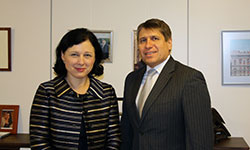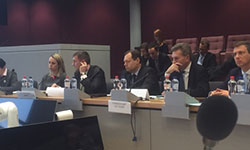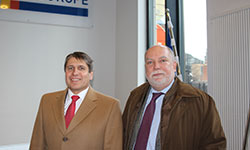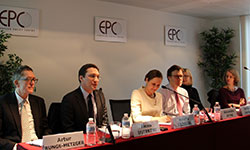BusinessEurope Headlines No. 2016-05
A business case for diversity
 More diversity in teams and in management is linked with higher returns, as well as more creative and innovative organisations. An increasing number of businesses actively seek ways to tap into the potential of a diverse workforce. Experience shows that there is no one-size-fits-all approach. Initiatives need to be company-led and effective at all levels. These were the main messages from Director General Markus J. Beyrer who met European Commissioner for Justice, Consumers and Gender Equality Ms Věra Jourová when they both addressed a high-level roundtable on 4 February 2016 in Brussels.
More diversity in teams and in management is linked with higher returns, as well as more creative and innovative organisations. An increasing number of businesses actively seek ways to tap into the potential of a diverse workforce. Experience shows that there is no one-size-fits-all approach. Initiatives need to be company-led and effective at all levels. These were the main messages from Director General Markus J. Beyrer who met European Commissioner for Justice, Consumers and Gender Equality Ms Věra Jourová when they both addressed a high-level roundtable on 4 February 2016 in Brussels.
Contact: Guillaume Cravero
Privacy Shield must be a reliable framework for transatlantic data transfers
 The announcement of the new EU-US agreement for transatlantic data flows - the EU-US Privacy Shield - is good news for companies. It is now important to finalise the details of the new system swiftly and grant companies a reasonable transition period to comply with it. This is the message that Carlos Rodrigues Cocina, Vice-Chair of BusinessEurope Internal Market Committee, conveyed during a meeting with industry stakeholders organised by European Commission Vice-President Ansip and Commissioners Jourova and Oettinger on 8 February. It is key now that national data protection authorities contribute constructively to the good functioning of the new arrangement and ensure a consistent European approach to transatlantic data transfers.
The announcement of the new EU-US agreement for transatlantic data flows - the EU-US Privacy Shield - is good news for companies. It is now important to finalise the details of the new system swiftly and grant companies a reasonable transition period to comply with it. This is the message that Carlos Rodrigues Cocina, Vice-Chair of BusinessEurope Internal Market Committee, conveyed during a meeting with industry stakeholders organised by European Commission Vice-President Ansip and Commissioners Jourova and Oettinger on 8 February. It is key now that national data protection authorities contribute constructively to the good functioning of the new arrangement and ensure a consistent European approach to transatlantic data transfers.
Contact: Cecilia Zappalà
Strengthening the EMU is fundamental to rebuilding trust in the euro
 Completing the Economic and Monetary Union (EMU), as set out in the Five Presidents’ report, is both a priority and a matter of urgency for business. Strengthening the EMU will be fundamental to rebuilding trust in the euro, and in turn in the European project, and can signal the renewed commitment of individual member states both in terms of solidarity and responsibility. This is the message members of BusinessEurope Economic and Financial Affairs Committee shared with Thomas Wieser, President of the Euro Working Group and the Council’s Economic and Financial Committee. Mr Wieser addressed the committee meeting on 10 February, speaking in particular about the ongoing debate on the future of the Economic and Monetary Union.
Completing the Economic and Monetary Union (EMU), as set out in the Five Presidents’ report, is both a priority and a matter of urgency for business. Strengthening the EMU will be fundamental to rebuilding trust in the euro, and in turn in the European project, and can signal the renewed commitment of individual member states both in terms of solidarity and responsibility. This is the message members of BusinessEurope Economic and Financial Affairs Committee shared with Thomas Wieser, President of the Euro Working Group and the Council’s Economic and Financial Committee. Mr Wieser addressed the committee meeting on 10 February, speaking in particular about the ongoing debate on the future of the Economic and Monetary Union.
Contact: Frederik Lange
Single market: BusinessEurope addresses Council High-Level Group on Competitiveness
 Still too many administrative and regulatory barriers discourage businesses from providing services across borders. If well designed, the “services passport” proposed by the European Commission in its single market strategy could make a company’s life easier. This was stressed by BusinessEurope Deputy Director General Jérôme P. Chauvin meeting high-level member state representatives at the Council High-Level Group on Competitiveness on 8 February. BusinessEurope supports the concept, but only if it truly reduces administrative burdens and leads to regulatory simplification. Through more transparency and legal certainty, companies and in particular SMEs and start-ups would be more confident to enter new markets and offer their services throughout the single market. BusinessEurope will further assess which elements should be included in the passport. More work is also needed to remove persistent obstacles linked to the many regulated professions that fragment labour markets, a lack of recognition of professional qualifications, diverse national standards and strains on company mobility.
Still too many administrative and regulatory barriers discourage businesses from providing services across borders. If well designed, the “services passport” proposed by the European Commission in its single market strategy could make a company’s life easier. This was stressed by BusinessEurope Deputy Director General Jérôme P. Chauvin meeting high-level member state representatives at the Council High-Level Group on Competitiveness on 8 February. BusinessEurope supports the concept, but only if it truly reduces administrative burdens and leads to regulatory simplification. Through more transparency and legal certainty, companies and in particular SMEs and start-ups would be more confident to enter new markets and offer their services throughout the single market. BusinessEurope will further assess which elements should be included in the passport. More work is also needed to remove persistent obstacles linked to the many regulated professions that fragment labour markets, a lack of recognition of professional qualifications, diverse national standards and strains on company mobility.
Read more or contact: Jérôme Chauvin
COP21 outcomes discussed at EPC event
 "The COP21 agreement is an important step forward for global efforts to reduce emissions and it is essential that all countries now deliver on their pledges", Alexandre Affre, BusinessEurope Director for Industrial Affairs, said on 5 February at the EPC policy dialogue 'Reflections on COP21 outcomes and next steps'. While the agreement offers a great potential in tackling climate change collectively, it does not solve the major issue of competitiveness yet. It implies to remain very vigilant on how the EU further develops its climate policy, he added.
"The COP21 agreement is an important step forward for global efforts to reduce emissions and it is essential that all countries now deliver on their pledges", Alexandre Affre, BusinessEurope Director for Industrial Affairs, said on 5 February at the EPC policy dialogue 'Reflections on COP21 outcomes and next steps'. While the agreement offers a great potential in tackling climate change collectively, it does not solve the major issue of competitiveness yet. It implies to remain very vigilant on how the EU further develops its climate policy, he added.
Contact: Alexandre Affre
How to achieve deeper private-sector involvement in development policy?
 European development policy is at a crossroads. Although it is now widely recognised that engagement of the private sector is important to achieve overall development objectives, there is still much to be done. The main question is how this can be best achieved – which synergies should be created among different policy fields and which instruments should be used? On 9 February, BusinessEurope met European Commission DG Trade and the Dutch Presidency to discuss how to take the development agenda forward in 2016. In the context of EU trade and development policies, as well as through the sustainable development goals, it was agreed that there is room for increasing participation of the private sector in policy-making for development to leverage more resources and expertise. For instance, better tailoring development instruments to the needs of the private sector, as well as facilitating effective private-private partnerships between European companies and companies in development countries should be further supported as a means to achieve sustainable development results. BusinessEurope will remain in close contact with the institutions, supporting an open dialogue among stakeholders and the use of innovative approaches in the EU development policy.
European development policy is at a crossroads. Although it is now widely recognised that engagement of the private sector is important to achieve overall development objectives, there is still much to be done. The main question is how this can be best achieved – which synergies should be created among different policy fields and which instruments should be used? On 9 February, BusinessEurope met European Commission DG Trade and the Dutch Presidency to discuss how to take the development agenda forward in 2016. In the context of EU trade and development policies, as well as through the sustainable development goals, it was agreed that there is room for increasing participation of the private sector in policy-making for development to leverage more resources and expertise. For instance, better tailoring development instruments to the needs of the private sector, as well as facilitating effective private-private partnerships between European companies and companies in development countries should be further supported as a means to achieve sustainable development results. BusinessEurope will remain in close contact with the institutions, supporting an open dialogue among stakeholders and the use of innovative approaches in the EU development policy.
Contact: Sofia Bournou or Maurice Fermont
Implementation of the 2014 posting of workers enforcement directive is key
 Implementation of existing EU rules on enforcement is key if we are to strengthen the single market in services while addressing fraudulent practices related to posting of workers. Linked to this, the new EU platform on undeclared work can facilitate information exchanges and better cooperation between enforcement authorities from different member states. Strengthening the social dialogue and social partner organisations can also contribute to better functioning and more cohesive EU labour markets. These were the main messages by Mario van Mierlo, Chair of BusinessEurope Social Protection Working Group, speaking at the conference on decent work organised by the Dutch Presidency on 8-9 February 2016 in Amsterdam.
Implementation of existing EU rules on enforcement is key if we are to strengthen the single market in services while addressing fraudulent practices related to posting of workers. Linked to this, the new EU platform on undeclared work can facilitate information exchanges and better cooperation between enforcement authorities from different member states. Strengthening the social dialogue and social partner organisations can also contribute to better functioning and more cohesive EU labour markets. These were the main messages by Mario van Mierlo, Chair of BusinessEurope Social Protection Working Group, speaking at the conference on decent work organised by the Dutch Presidency on 8-9 February 2016 in Amsterdam.
Contact: Magda Bober
Innovation principle helps create an innovation-friendly regulatory framework
 Following up on its successful innovation conference on 26 January, BusinessEurope had the opportunity to report at the Joint Competitiveness and Growth / Research Working Party on the Council on 9 February. Alexandre Affre, BusinessEurope Director for Industrial Affairs, outlined the discussions that took place about the concept of an Innovation principle. He stressed that it has the potential to be a systemic solution to move towards a more innovation-friendly regulatory framework in the EU.
Following up on its successful innovation conference on 26 January, BusinessEurope had the opportunity to report at the Joint Competitiveness and Growth / Research Working Party on the Council on 9 February. Alexandre Affre, BusinessEurope Director for Industrial Affairs, outlined the discussions that took place about the concept of an Innovation principle. He stressed that it has the potential to be a systemic solution to move towards a more innovation-friendly regulatory framework in the EU.
Contact: Alexandre Affre
Calendar
 15 February: conference on energy-intensive industries, Brussels
15 February: conference on energy-intensive industries, Brussels- 16 February: high-level conference on the digital transformation of European industry and enterprises, Brussels
- 16-17 February: conference on vocational education and training "Skills for a lifetime", Amsterdam
- 18-19 February: European Council meeting
- 3 March: BusinessEurope Day 2016
Contact: BusinessEurope Headlines